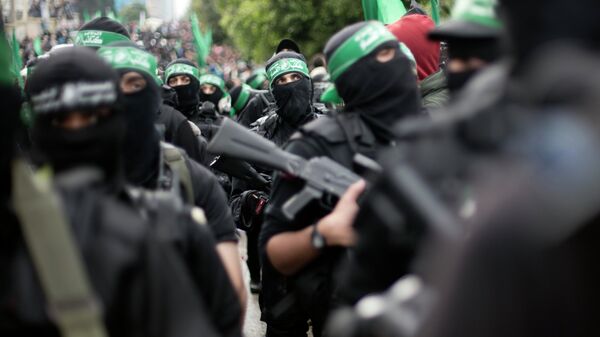According to reports, Israel is expected to expand Gaza's fishing zone, increase the amount of trucks packed with goods that can enter the area, and boost the enclave's supply of medical equipment.
In exchange, Hamas promises to bolster its security measures to prevent indiscriminate rocket fire at Israel's southern communities and to gradually decrease its weekly Gaza-border demonstrations that kicked off in March 2018 following Washington's decision to recognise Jerusalem as Israel's capital.
Truce Nowhere in Sight
But Saeed Sadik, a professor of political sociology at the American University in Cairo, believes a real long-term truce between the sides is out of the question.
"For a solid and a long-term agreement to take place you need more than just a temporary bandage. You need to have a vision, a plan and several other players including the US to be involved, not just Egypt".
Cairo has been mediating between Israel and Hamas, which has controlled the Gaza Strip since 2007, when the Islamic group seized control over the enclave ousting its previous government, Fatah.
Egypt, which houses some 50,000 Palestinians, many of whom fled during Israel's war of independence in 1948, has an interest to keep the tensions low.
With instability brewing in neighbouring Libya and Sudan, Cairo is concerned that an escalation in Gaza could spill over to Egypt, jeopardising the country's stability and its tourism industry, which earned the Egyptian government some $11.40 billion in 2018, after a record low of $3.80 billion in 2016.
Despite decades-long Egyptian efforts, a truce between the rival sides appears to be nowhere in sight, and Sadek believes it is because neither of them is interested in an agreement.
"In Israel you have the right-wing parties winning", he said referring to the hawkish Netanyahu government that has governed the country for more than a decade, "while in Gaza, Hamas adds fuel to the fire with its weekly March of Return protests".
Although those protests brought the Islamic group the much desired media attention, they also cost them lives. According to the United Nations Office for the Coordination of Humanitarian Affairs, Israeli security forces have killed 195 people and injured more than 29,000 others since the eruption of demonstrations in early 2018.
Other Players Contribute to Stagnation
But Hamas is far from being the only reason behind the lack of an agreement, as the Gaza Strip has other actors, independent of Hamas, that don't want to see a deal reached.
One such is the Palestinian Islamic Jihad (PIJ). Unlike Hamas, which acts as the enclave's government bearing full responsibility for the people of Gaza, the Islamic Jihad has no such obligations acting as a resistance group. As such, it is interested in keeping the conflict alive to justify its existence.
Tensions between the two groups escalated in November following Israel's targeted killing of a high profile commander - Baha Abu al-Atta. While the PIJ was expected to join forces with Hamas against Israel following the assassination, the Islamic group chose to step aside watching the confrontation from the sidelines.
Another factor bogging down progress is the alleged foreign influence of Qatar and Turkey. According to Israeli reports, Hamas has received more than $1 billion from Qatar since 2012, while Turkey provided the government of the enclave with some $250-300 million in annual financial aid.
"Naturally, Israel doesn't want these players to be involved and would rather have [Egypt's President Abdel Fattah] Al Sisi as the mediator, especially given the fact that both countries enjoy good ties and the leaders speak over the phone on a regular basis", said Sadik, adding that a solution will only be possible if either one side is defeated or when both sides are exhausted.
Until that happens, however, Israel might want to implement a different strategy. "You need to force the peace plan on both sides but you also need to cut off the funds that Hamas gets from its rich donors and minimise the attention it receives from the media", summed up Sadik.



